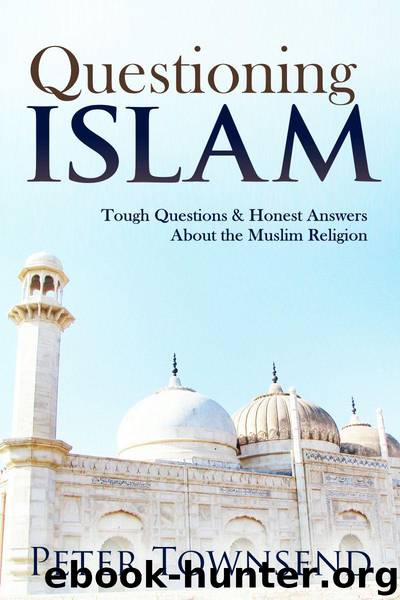Questioning Islam: Tough Questions & Honest Answers About the Muslim Religion by Townsend Peter

Author:Townsend, Peter [Townsend, Peter]
Language: eng
Format: mobi, epub, pdf
Published: 2014-06-25T16:00:00+00:00
Detailed prophecies (name, place, date, activities, etc.) that can unambiguously be applied to Muhammad alone, in other words it can only be about him and no one else.
Clear evidence that the specific prophecy was in existence long before Muhammad arrived.
Evidence of exactly how these prophecies were fulfilled according to contemporary records.
The two most commonly cited ‘Muhammadan Prophecies’ do not pass these tests. They are both from the Bible. In its pages Moses speaks about a ‘greater prophet’92 who will come after him, and Jesus Christ speaks about the ‘comforter’93 who will appear to continue his ministry. Both are very general (referring only to a prophet or comforter). No mention is made of Arabia, of the name of the prophet or of his essential message. These texts can therefore very easily be applied to other figures and this is, in fact, the case. Within the Bible itself, the Moses prophecy was applied to Jesus Christ and the ‘comforter’ prophecy was applied to the coming of the Holy Spirit. There is, furthermore, no contemporary evidence that anyone saw Muhammad’s coming as the fulfillment of these prophecies. Muslims will have to do much better to convince us that Muhammad's coming was foretold. To repeat, they will have to produce detailed prophecies (name, place, date, activities, etc.) that can unambiguously be applied to Muhammad and no one else.
Muhammad was Highly Inaccurate as a Prophet.
How will we be able to determine whether someone is a true prophet? Most people would state that the basic test would have to be fulfilled prophecy. In other words, the prophet will have to be able predict certain events and this will then come to pass. As it turns out, Muhammad did particularly badly in this area. He made several predictions that were spectacularly inaccurate. One incident will serve to illustrate this point. While exiled from Mecca, Muhammad tried to lead a large group of Muslims to Mecca to perform the Umrah (lesser pilgrimage). Muhammad expected that the Meccans would strongly oppose any attempt by him and his followers to enter Mecca and used Qur’an 48:27 to reassure his followers: “Truly did Allah fulfill the vision for His Messenger. Ye shall enter the Sacred Mosque, if Allah wills, with minds secure, heads shaved, hair cut short, and without fear. For He knew what ye knew not, and He granted, besides this, a speedy victory."
On the way to Mecca, Muhammad’s party was met by a Meccan emissary who indicated that the forces of the Quraysh would resist any attempt by Muhammad and his followers to enter the city. Muhammad did not feel confident in forcing the Meccans to relent, so he had to mount a sudden climb-down. He agreed to sign a treaty with the Meccans (the Treaty of Hudabiya) and even took the extraordinary step of handing a Meccan convert to Islam back to the people of Mecca. In addition to this, he was forced to change his title at the end of the treaty document from “Muhammad: Apostle of Allah” to “Muhammad: Son of Abdullah.
Download
Questioning Islam: Tough Questions & Honest Answers About the Muslim Religion by Townsend Peter.epub
Questioning Islam: Tough Questions & Honest Answers About the Muslim Religion by Townsend Peter.pdf
This site does not store any files on its server. We only index and link to content provided by other sites. Please contact the content providers to delete copyright contents if any and email us, we'll remove relevant links or contents immediately.
The History of Jihad: From Muhammad to ISIS by Spencer Robert(2629)
Nine Parts of Desire by Geraldine Brooks(2369)
The Turkish Psychedelic Explosion by Daniel Spicer(2358)
The First Muslim The Story of Muhammad by Lesley Hazleton(2271)
The Essential Rumi by Coleman Barks(2048)
1453 by Roger Crowley(2031)
The Last Mughal by William Dalrymple(1858)
Trickster Travels: A Sixteenth-Century Muslim Between Worlds by Davis Natalie Zemon(1848)
Muhammad: His Life Based on the Earliest Sources by Martin Lings(1648)
God by Aslan Reza(1644)
by Christianity & Islam(1635)
A Concise History of Sunnis and Shi'is by John McHugo(1567)
No God But God by Reza Aslan(1545)
Magic and Divination in Early Islam by Emilie Savage-Smith;(1534)
The Flight of the Intellectuals by Berman Paul(1503)
Nothing to Envy by Barbara Demick(1450)
Art of Betrayal by Gordon Corera(1431)
What the Qur'an Meant by Garry Wills(1394)
Getting Jesus Right: How Muslims Get Jesus and Islam Wrong by James A Beverley & Craig A Evans(1342)
